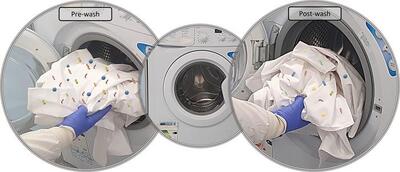Is home washing contributing to antibiotic-resistant infection spread?

Hospital-acquired infections are a major public health concern. This is in part because they frequently involve antibiotic-resistant bacteria. Many nurses and healthcare workers clean their uniforms at home in standard washing machines; however, according to a 2025 study out of the UK, washing machine biofilms may harbour potential pathogens and antibiotic resistance genes, meaning home washing of healthcare worker uniforms may be unknowingly contributing to the spread of antibiotic-resistant infections in hospitals.
With some studies having found that bacteria can be transmitted through clothing, the question that follows is whether these machines can sufficiently prevent the spread of dangerous microbes. To tackle this question, a research team — led by Katie Laird of the UK’s De Montfort University — examined six models of home washing machine to evaluate whether they were successfully decontaminating healthcare worker uniforms.
This evaluation involved washing contaminated fabric swatches in hot water, using a rapid or normal cycle. What was found is that half of the machines did not disinfect the clothing during a rapid cycle, while one-third failed to clean sufficiently during the standard cycle. Biofilms from inside 12 washing machines were also sampled, with DNA sequencing revealing the presence of potentially pathogenic bacteria and antibiotic resistance genes.

Also shown through investigation was that bacteria can develop resistance to domestic detergent, something that increases bacterial resistance to certain antibiotics. What is suggested by these findings is that many home washing machines may be insufficient for decontaminating healthcare worker uniforms, and in fact may be contributing to the spread of hospital-acquired infections and antibiotic resistance. As such, the researchers argue that laundering guidelines given to healthcare workers should be revised.
Such revision, the researchers say, should aim to ensure that home washing machines are cleaned effectively or, alternatively, that — to improve patient safety and control the spread of antibiotic-resistant pathogens — healthcare facilities should use onsite industrial machines to launder uniforms. “Our research shows that domestic washing machines often fail to disinfect textiles, allowing antibiotic-resistant bacteria to survive,” the researchers said.
“If we’re serious about transmission of infectious disease via textiles and tackling antimicrobial resistance, we must rethink how we launder what our healthcare workers wear.”
The study, ‘Domestic laundering of healthcare textiles: disinfection efficacy and risks of antibiotic resistance transmission’, has been published open access in PLOS One and you can read it at doi.org/10.1371/journal.pone.0321467.
Medicine shortages are testing Australia's health system and clinicians need national support
Medicine shortages are no longer isolated supply disruptions. They are escalating and directly...
Mindfulness and endoscopies — a more effective combination?
A UK study involving 231 patients has advocated 'mindful endoscopy' — allowing...
How do different types of pain influence empathy?
Different types of pain influence how unpleasantly we perceive it but also how we empathise with...




![[New Zealand] Transform from Security Awareness to a Security Culture: A Vital Shift for SMB Healthcare — Webinar](https://d1v1e13ebw3o15.cloudfront.net/data/89856/wfmedia_thumb/..jpg)
![[Australia] Transform from Security Awareness to a Security Culture: A Vital Shift for SMB Healthcare — Webinar](https://d1v1e13ebw3o15.cloudfront.net/data/89855/wfmedia_thumb/..jpg)



